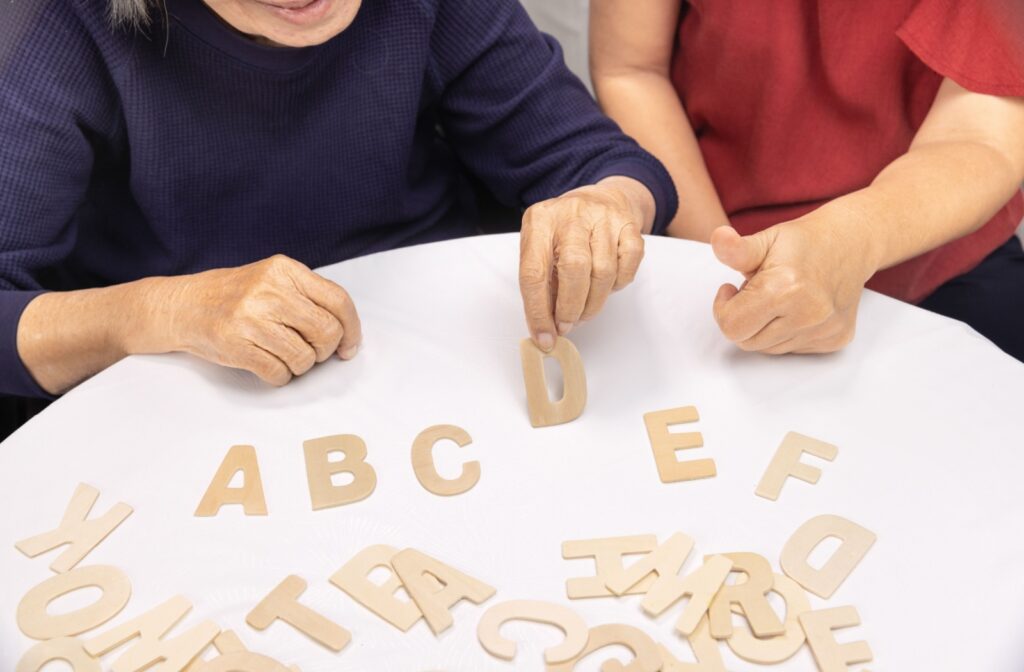As we get older, prioritizing our cognitive health becomes more and more important. Staying mentally sharp can do wonders for our quality of life, and it can play a big role in maintaining our independence.
Simple activities like reading and games can help seniors maintain their cognitive skills, but there are also specific memory exercises that some healthcare professionals recommend.
Memory exercises can be helpful for some people, but the results can vary based on your current cognitive health. Just like every other part of your body, regular exercise can make a big difference for your brain. By regularly performing memory exercises, some seniors may be able to strengthen their thinking skills and improve their memory.
Our senior living community at Parsons House Preston Hollow has services and amenities that are designed to support and encourage cognitive & mental health.
What Are Memory Exercises?
Think of memory exercises like any other exercise: you repeatedly use a muscle in different ways to build strength. These exercises cover a wide range of activities, from puzzles and brain teasers to memory games and imagination techniques. They’re a great way to nurture personal growth and can make a big difference in maintaining cognitive health.
Memory exercises aim to keep the mind active and engaged. Some of them are designed to help challenge your memory and improve your ability to remember details.
By regularly performing these exercises, seniors can improve how well their memory functions—along with several other parts of the brain. These exercises could boost overall cognitive function and may even help delay cognitive decline and memory impairment.
Why Are Memory Exercises Important?
Memory exercises can play an essential role in helping keep your brain strong. This can be especially important for seniors experiencing the effects of cognitive decline. By regularly performing memory exercises, some seniors can keep their minds strong.
In more scientific terms, memory exercises help to promote neuroplasticity, the brain’s ability to form new connections and reorganize thought patterns. This lets your brain constantly adapt and adjust, training the muscles needed to stay sharp and functioning.
Different Types of Memory Exercises
There are a few different types of memory exercises that can be worked into the daily routine of seniors, including:
- Mnemonic techniques
- Crosswords and other games
- Online apps designed for memory training
Exploring your options can help you find a form of memory training that feels comfortable and suited to your lifestyle.
Mnemonic Techniques
Mnemonic techniques are like memory aids that help you remember information more effectively. These include acronyms, visual representation, and more. By utilizing these techniques, seniors may be able to improve their ability to remember important information.
Here are a few mnemonic techniques you can try:
- Repeat new information several times out loud
- Visualize important things around your house when you aren’t near them
- Turn information into rhymes or songs
- Take notes with acronyms or nicknames
These exercises can help your brain learn new ways to retain information.
Crossword Puzzles & Games
Crossword puzzles, word searches, jigsaw puzzles, and other games can be great ways to exercise your memory by helping you remember words, make connections, and apply problem-solving skills. Regularly solving these puzzles could improve your vocabulary, memory recall, and overall cognitive abilities.
Online Apps
In the digital era, plenty of online apps offer memory exercises. These apps can turn memory training into a stimulating game, making it engaging and fun. With games like memory cards, word association, and puzzles, these apps can all help challenge the brain and encourage cognitive engagement.
These apps are easily accessible and can be used anytime, anywhere, making it convenient for seniors to incorporate memory exercises into their daily routine. There’s some evidence that using these memory games regularly can help improve your memory recall and cognitive abilities, but more research is needed to confirm their benefits.

Other Ways to Support Cognitive Health
While memory exercises can be a great way to train your brain, think of them like one small piece of the puzzle. It’s important to take a well-rounded approach to maintaining cognitive health, especially for adults in memory care.
Here are a few other important areas where we help support seniors facing cognitive challenges:
- Regular exercise: Engaging in physical activity has been linked to improved cognitive function.
- A healthy diet: Make sure you’re eating a balanced diet with plenty of fruits, vegetables, whole grains, and other nutrient-rich foods.
- Socializing: An active social life and meaningful connections both play an important role in stimulating the brain and combating cognitive decline.
Visit our services and amenities page to see how we support these three aspects of cognitive health at Parsons House Preston Hollow.
A Holistic Approach to Senior Care
At Parsons House Preston Hollow, we believe in taking a holistic approach to senior care, and we want to do everything we can to support older adults at all stages of life. Our community is dedicated to providing personalized care that caters to each resident’s unique needs for memory care, assisted living, and independent living. Remember, staying cognitively strong can be within your reach. Book a tour with us today, and learn more about the support we provide for healthy senior living!


